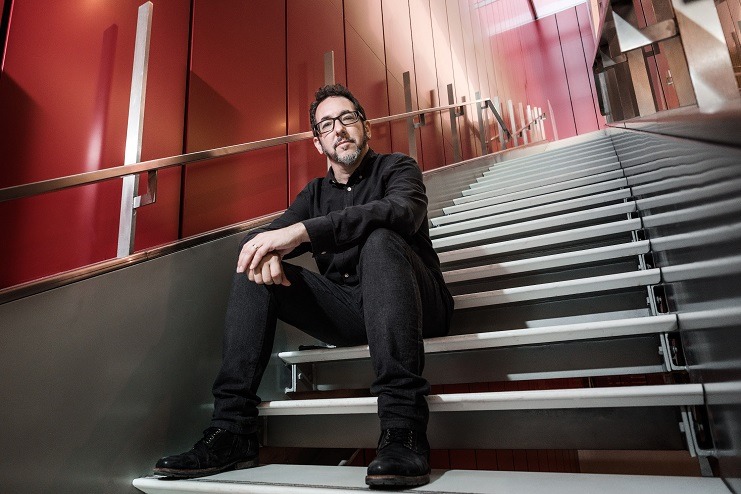#WaraElMazzika: Exclusive With Bill Bragin, One of the Most Influential Figures in New York’s Live Music Industry
In this edition of #WaraElMazzika, we had an exclusive interview with Bill Bragin, the Executive Artistic Director of The Arts Center at New York University in Abu Dhabi (NYUAD). Bill was named one of the most influential figures in the New York live-music business by The New York Times, and you’ll understand why after knowing about his achievements and reading his insights.
We got to discuss the art scene in the COVID-19 era, how the pandemic affected the arts sector positively through reaching out to new and wider audiences, and more. Follow our hashtag #WaraElMazzika for more exclusives from the music and entertainment industry.

Talk to us about the art scene in the COVID-19 era.
The arts scene has been understandably super quiet for in-person events, but it’s gotten extremely active online. The Arts Center at NYU Abu Dhabi (NYUAD) just finished 3 months of weekly performances from our archives, Reconnect. monthly spoken word and music open mics in partnerships with Rooftop Rhythms, an artist talk on collaboration in partnership with the US Embassy, and an online concert/revue by Abu Dhabi Choral Group (ADCG). During the quarantine, I’ve personally attended online events from the NYUAD Art Gallery, Department of Culture and Tourism – Abu Dhabi, Abu Dhabi Classics, Abu Dhabi’s Cultural Foundation, Cinema Akil, Sharjah Art Foundation, Alserkal Avenue, the Smithsonian Folklife Festival’s UAE Focus, Louvre Abu Dhabi, Art Jameel, The Junction, and Sheikh Sultan Sooud al Qassemi’s Cultural Majlis among others.
As I answer this question, I’m actually realizing how active it has truly been. In general, the arts sector has responded with a great deal of urgency, creativity, and care for its audiences.
How do you think the pandemic affected the arts sector positively?
I’d be hard-pressed to describe anything about the pandemic as positive. I think the sector has learned how vital it is to people’s well-being, especially during difficult times. The arts have been a lifeline to people – allowing us to tap into our emotions at a very difficult time and helping us to feel connected when we’ve been physically isolated. The UAE government has also been quite public in its support for artists through relief efforts and in its #CultureUpFront initiative. The endorsement of the nation’s leadership is so important, and I think will contribute to future growth and investment in the sector.
Tell us about your experience as a pioneer leader in the art sector in the US, the UAE, and the region.
I always describe the cultural sector in the UAE as “porous.” When someone new shows up on the cultural scene, they are welcomed and introduced around. People did that with me, and in turn pay it forward, doing that for others as newcomers join the community. My experience is one of collaboration. I’ve been involved in numerous networks of arts professionals in North America, and that experience has been growing here. Since the pandemic started, along with my colleagues Linsey Bostwick from The Arts Center, and Maya Allison from the NYUAD Art Gallery, we’ve convened periodic meetings of up to 50+ leaders from the performing arts/music, visual arts, and cinema worlds, from all across the UAE. We’ve found a tremendous spirit of cooperation and generosity, with a goal that this continues even after the pandemic and work from the home period has ended.
In your opinion, why is art important to keep people connected?
Art is what makes us human. It allows us to tap into the strongest emotions of the human condition. It allows us to celebrate our best times, and mourn our worst. It provokes us to think about the world in new ways. It gives us insights into lives that are different from our own. It can spark us to action, send us dancing around our kitchens, or help us to relax into sleep. It can celebrate our highest achievements.
How did The Arts center at NYUAD turn the challenges and weaknesses resulting from COVID-19 into opportunities and strengths?
Being forced to move online with our programs meant that we needed to be inventive. We had to really think about what was important to us and why we do what we do. Through online programming, with real-time Q&A’s and online chats, we found that even through a screen, our work could help people feel connected to a community. It was quite healing.
The Arts Center hosted 16 virtual performances from April to June, which attracted more than 27,000 people with over 1.6 million views across the Center’s official channels on Facebook and YouTube.
I remember one audience member tweeted after a show: “This was the first time I felt human since the quarantine started.” This was someone from LA, which brings another point – with our online programming, we partnered with organizations from Singapore to Cairo, from Montpellier to Rwanda, from New York to Minneapolis to Los Angeles. This led to press coverage on CNN, Euronews, The New York Times, the LA Times, and Forbes, to name just a few. For arts presenters outside of what’s considered the center of the art world, this was important. Equally important was that audiences from all these places were watching our programs – discovering all talented UAE based performers in Rooftop Rhythms and ADCG, as well as the highest level of international artists whose work we’ve presented over the years.
